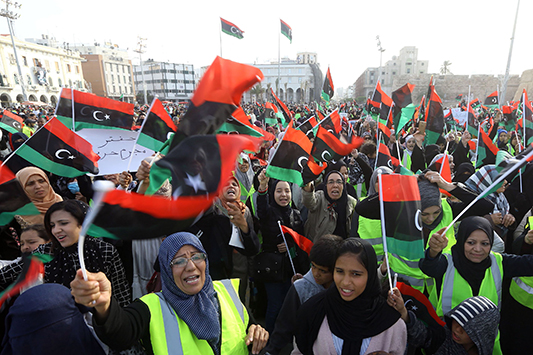
UNITED NATIONS: The White House has revealed that President Donald Trump reached out personally to Libyan warlord Khalifa Haftar, as a push at the United Nations to broker a ceasefire hit trouble. Observers see Trump's words of praise for the strongman, at the expense of internationally-recognized leader Fayez Al-Sarraj, as evidence of US support that explains Haftar's determination to pursue his offensive to seize Tripoli.
Trump and Haftar spoke on Monday "to discuss ongoing counterterrorism efforts and the need to achieve peace and stability in Libya," according to the White House. A statement said that Trump "recognized Field Marshal Haftar's significant role in fighting terrorism and securing Libya's oil resources," adding that "the two discussed a shared vision for Libya's transition to a stable, democratic political system." The White House did not say why it delayed giving news of the phone call.
Fighting till the end
Haftar, seen by his allies Egypt and the United Arab Emirates as a bulwark against Islamists, has declared he wants to seize the capital, now controlled by a UN-recognized government and an array of militias. The military commander backs a rival administration based in eastern Libya that is refusing to recognize the Tripoli government's authority. On Thursday, Russia and the United States opposed a British bid backed by France and Germany at the UN Security Council to demand a ceasefire in Libya. Russia insisted on having no criticism of Haftar in the proposed resolution, while the United States said it wanted more time to consider the situation.
Diplomats say the signaling from Washington goes a long way toward explaining Haftar's aggressive strategy in the face of strong condemnation by the European powers and the UN. "Haftar believes he has to fight until the end," said one diplomat at the UN speaking on the condition of anonymity. Despite some military setbacks, Haftar maintains that he "can prevail," according to several others. News of Trump's phone call "clarifies" the US position, noted another diplomat, after Britain fought in vain for five days to try to pass a resolution calling for a ceasefire and unconditional humanitarian access to the combat zones.
UN authority undercut
In terms of international backing, Haftar enjoys the support of Egypt, Saudi Arabia, the United Arab Emirates, Russia and-now, clearly-the United States. Sarraj, whose control over his country remains extremely tenuous, is backed by Qatar and Turkey. Haftar would not have unleashed his offensive without a green light from his backers, and getting him to back down from the "impasse" will depend on their will, the diplomats said.
France of backing assault
Meanwhile, Hundreds of "yellow vest" protesters demonstrated in Tripoli against an offensive by military strongman Khalifa Haftar on the Libyan capital and accused France of backing him. Wearing the trademark yellow vests of French anti-government demonstrators, they were among thousands of Libyans who flooded a central Tripoli square to rally in support of the internationally-recognized Government of National Accord (GNA). "We are surprised by France's conduct in the face of the Tripoli attack," read a sign held up by the demonstrators.
Portraits of French President Emmanuel Macron and the leaders of Egypt and Saudi Arabia were also carried by demonstrators or placed on the ground for people to trample them. Haftar is seen by his allies - Egypt and the United Arab Emirates - as a bulwark against Islamists who have gained a foothold in Libya after the 2011 uprising that ousted and killed dictator Muammar Gaddafi.
"Other countries must stop interfering in Libyan affairs," Haifa Ferjani, a 23-year-old protester said. "France says it is a friend but secretly backs those attacking our city and our homes," added the young woman. The French embassy in Libya on Friday tweeted - in Arabic - that Paris was "opposed to the attack" on Tripoli and urged all parties to abide by a ceasefire and engage in peace negotiations. Khalifa Haftar's self-styled Libyan National Army (LNA), based in the country's east, launched an offensive on April 4 to take Tripoli, the western seat of the UN-recognized GNA.
Friday's rally came days after a smaller protest brought out dozens of "yellow jacket" demonstrators who on Tuesday also demanded the GNA sever ties with countries that "back aggression" on Tripoli. It also comes a day after UN envoy Ghassan Salame warned of "a widening conflagration" in other parts of the North African country. On Thursday GNA interior minister Fathi Bach Agha lashed out at France, accusing it directly for the first time of supporting "the criminal Haftar" and saying it was cutting security ties with Paris.
France immediately denied the claim. "Tripoli's claim of support and diplomatic cover for Haftar are completely unfounded," a French foreign ministry official said. "France supports the legitimate government of Prime Minister Fayez al-Sarraj and the mediation of the UN towards an inclusive political solution in Libya," the French presidency said in a statement. More than 200 people have been killed since the violence erupted, and more than 900 wounded, the World Health Organization said on Thursday.- Agencies




